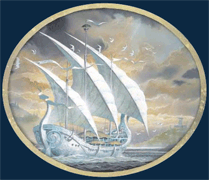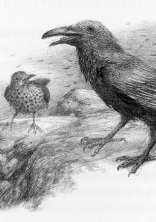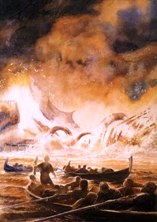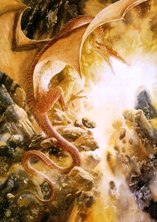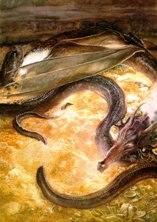Tolkien Calendar: The Hobbit
Tolkien Calendar: The Hobbit
November 3: TA 2941
3 November 2008 08:32:50Elvenking's host leaves Mirkwood. Thorin hears news.
We last left Thorin & Co. encamped in the old look-out post at the South-West corner of the Mountain and peering anxiously across the surrounding countryside for any clue to the whereabouts of the marauding Smaug. At length they spy many birds gathering, but no further news of the dragon reaches them as night falls. All through the night they keep at least one on watch, but the morning only brings more birds, among them the harsh cry of carrion crows.
Suddenly, Bilbo spies the thrush once again, glad to see that the old bird had escaped from Smaug's destruction of the mountainside. He flies straight to the party and sings to them most urgently, but no one can understand him. Balin wishes fervently that the bird was a raven, because of old there had been great friendship between the dwarves of the Mountain and the ravens that resided upon the top of the very look-out post Thorin & Co. are currently using for shelter, which had been named Ravenhill in their honor. Balin recalls the "wise and famous" raven Carc and his wife and tells Bilbo that the ravens had brought them news and carried messages in exchange for bright objects "they coveted to hide in their dwellings."
Once again, The Professor displays for us both his knowledge of the flora and fauna of his native England, where the raven flourishes, and ties to his "mythology for England" a potent symbol associated with the ancient Norse God Odin. The following quote is taken from the Encyclopedia Britannica On-Line:
The thrush suddenly departs with a loud call and shortly returns with a "most decrepit old bird" who proves to be none other than Roäc, son of Carc. He is ancient indeed, it being 153 years since he came "out of the egg"! From Roäc, Thorin & Co. learn that Smaug is dead, thanks to the knowledge of the old thrush ("may his feathers never fall"), who witnessed the deed. But Roäc also bears news that the Elvenking and his host are on the way, having heard of the death of the dragon. In addition, the Lake men who have lost lives and homes to Smaug's rampage are also on the way, seeking "amends from your treasure whether you are alive or dead." Roäc tells Thorin of Bard the Bowman, whose daring shot killed the dragon, calling him "a grim man but true" and expressing his hope that there will be peace once more among the dwarves, men, and elves "after the long desolation."
But Thorin, deeply caught up by treasure sickness, has no ear for peace, and desires only to secure the treasure to himself and his folk, ". . . none of our gold shall thieves take or the violent carry off while we are alive." He asks Roäc to send messengers to Thorin's kin in the north, but most especially to his cousin Dain in the Iron Hills, asking them to send a well-armed, fast-traveling fighting force to his aid.
Old Roäc seems unhappy to hear such war-like words, but agrees to help nonetheless. And Bilbo? Well, with the death of the dragon, the Tookish side of him is taking a well-deserved breather, and the practical, business-like Baggins nature emerges once again. He is concerned about how little food they have left and feels that, with the death of the dragon and the achievement of the treasure, his part in this business has been completed. Little does he know that his most important task - one that will require all of his ingenuity and generosity of spirit - is yet ahead of him.
Suddenly, Bilbo spies the thrush once again, glad to see that the old bird had escaped from Smaug's destruction of the mountainside. He flies straight to the party and sings to them most urgently, but no one can understand him. Balin wishes fervently that the bird was a raven, because of old there had been great friendship between the dwarves of the Mountain and the ravens that resided upon the top of the very look-out post Thorin & Co. are currently using for shelter, which had been named Ravenhill in their honor. Balin recalls the "wise and famous" raven Carc and his wife and tells Bilbo that the ravens had brought them news and carried messages in exchange for bright objects "they coveted to hide in their dwellings."
Once again, The Professor displays for us both his knowledge of the flora and fauna of his native England, where the raven flourishes, and ties to his "mythology for England" a potent symbol associated with the ancient Norse God Odin. The following quote is taken from the Encyclopedia Britannica On-Line:
- "Odin was called the Raven God. He had a throne, Hlidskjalf, in a watchtower in the heavenly realm of Asgard, from which he could see anything that happened in the nine worlds of the universe, and nothing escaped his gaze. Odin would sit on this lofty throne with two ravens, Huginn (Thought) and Muninn (Memory), perched on his shoulders. He sent these birds out into the world each day, and they would return to whisper in his ear everything they had seen."
The thrush suddenly departs with a loud call and shortly returns with a "most decrepit old bird" who proves to be none other than Roäc, son of Carc. He is ancient indeed, it being 153 years since he came "out of the egg"! From Roäc, Thorin & Co. learn that Smaug is dead, thanks to the knowledge of the old thrush ("may his feathers never fall"), who witnessed the deed. But Roäc also bears news that the Elvenking and his host are on the way, having heard of the death of the dragon. In addition, the Lake men who have lost lives and homes to Smaug's rampage are also on the way, seeking "amends from your treasure whether you are alive or dead." Roäc tells Thorin of Bard the Bowman, whose daring shot killed the dragon, calling him "a grim man but true" and expressing his hope that there will be peace once more among the dwarves, men, and elves "after the long desolation."
But Thorin, deeply caught up by treasure sickness, has no ear for peace, and desires only to secure the treasure to himself and his folk, ". . . none of our gold shall thieves take or the violent carry off while we are alive." He asks Roäc to send messengers to Thorin's kin in the north, but most especially to his cousin Dain in the Iron Hills, asking them to send a well-armed, fast-traveling fighting force to his aid.
Old Roäc seems unhappy to hear such war-like words, but agrees to help nonetheless. And Bilbo? Well, with the death of the dragon, the Tookish side of him is taking a well-deserved breather, and the practical, business-like Baggins nature emerges once again. He is concerned about how little food they have left and feels that, with the death of the dragon and the achievement of the treasure, his part in this business has been completed. Little does he know that his most important task - one that will require all of his ingenuity and generosity of spirit - is yet ahead of him.
© middle-earth-journeys.com. Images © Alan Lee.
November 2: TA 2941
2 November 2008 08:37:02Goblins, Beorn and Gandalf hear of Smaug's death.
Just as stories must ascend to their climax, they cannot just end there, but must descend to their endings. Smaug's death is certainly the central event of The Hobbit, but perhaps not the most meaningful, and Our Author must begin immediately to build the minor crescendoes. The devastation of Esgaroth, with one-quarter of the people of Lake-town dead, is the immediate theme, as is the political situation: with confidence in the corrupt Master low and Bard the Bowman presumed to be dead:
"Bard is not lost!" he cried. "He dived from Esgaroth, when the enemy was slain. I am Bard, of the line of Girion; I am the slayer of the dragon!"
"King Bard! King Bard!" they shouted; but the Master ground his chattering teeth.
(Doesn't this remind you of a similar scene in The Lord of the Rings?)
Although Bard declined the kingship (since his ancestors were lords of Dale and not Kings of Esgaroth), he still took charge of relief and recovery and sent messengers to the King of the Woodland Elves for aid. But the messengers found the elves already on the way:
War was building.
- "And in the very midst of their talk a tall figure stepped from the shadows. He was drenched with water, his black hair hung wet over his face and shoulders, and a fierce light was in his eyes."
"Bard is not lost!" he cried. "He dived from Esgaroth, when the enemy was slain. I am Bard, of the line of Girion; I am the slayer of the dragon!"
"King Bard! King Bard!" they shouted; but the Master ground his chattering teeth.
(Doesn't this remind you of a similar scene in The Lord of the Rings?)
Although Bard declined the kingship (since his ancestors were lords of Dale and not Kings of Esgaroth), he still took charge of relief and recovery and sent messengers to the King of the Woodland Elves for aid. But the messengers found the elves already on the way:
- "The Elvenking had received news from his own messengers and from the birds that loved his folk, and already knew much of what had happened. Very great indeed was the commotion among all things with wings that dwelt on the borders of the Desolation of the Dragon. The air was filled with circling flocks, and their swift-flying messengers flew here and there across the sky. Above the borders of the Forest there was whistling, crying and piping. Far over Mirkwood tidings spread: "Smaug is dead!" Leaves rustled and startled ears were lifted. Even before the Elvenking rode forth the news had passed west right to the pinewoods of the Misty Mountains; Beorn had heard it in his wooden house, and the goblins were at council in their caves."
War was building.
© middle-earth-journeys.com. Images © Alan Lee.
November 1: TA 2941
1 November 2008 09:18:55Categories: Hobbit Calendar
Bilbo returns to Smaug's chamber in the afternoon. In the evening Smaug smashes the door, attacks Lake-town, and is killed.
"Never laugh at live dragons, Bilbo, you fool!"
November 1 is one of those all inclusive Tolkien cataclysmic days. So much happens in an afternoon that it is hard to comprehend it all and keep one's timeline straight.
Bilbo has his final conversation with Smaug and succeeds in stirring the dragon's anger to the breaking point. His rather careless boasting and dropping of hints finds it's mark. Bilbo is scorched but eludes the enraged Smaug. Leaving his lair and searching for the intruder, Smaug is further incensed at not finding anyone. He takes out his fury on the mountainside, and the Dwarves and Bilbo barely escape into the mountain tunnel. Convinced that Bilbo is aided by the Men of Lake-town, Smaug roars off to reek his vengeance there. Bilbo's words indeed pointed him in that direction.
I am always struck by the Dwarves overwhelming pre-occupation with the golden hoards under the Mountain. It consumes their every waking moment and here it is no exception. Even living with the growing fear of the awakening Smaug and the danger that he presents, there is no talk of warning Lake-town. There is little talk of much else but the treasure, even when the frightened Bilbo issues his warnings.
So into the Mountain they go and while Lake-town is besieged, the Dwarves marvel at the golden treasure so long guarded by the Dragon. They are uneasy, but enraptured. This is also the day that Bilbo receives his priceless shirt of Mithril that plays such an important role many years hence.
November 1 is one of those all inclusive Tolkien cataclysmic days. So much happens in an afternoon that it is hard to comprehend it all and keep one's timeline straight.
Bilbo has his final conversation with Smaug and succeeds in stirring the dragon's anger to the breaking point. His rather careless boasting and dropping of hints finds it's mark. Bilbo is scorched but eludes the enraged Smaug. Leaving his lair and searching for the intruder, Smaug is further incensed at not finding anyone. He takes out his fury on the mountainside, and the Dwarves and Bilbo barely escape into the mountain tunnel. Convinced that Bilbo is aided by the Men of Lake-town, Smaug roars off to reek his vengeance there. Bilbo's words indeed pointed him in that direction.
I am always struck by the Dwarves overwhelming pre-occupation with the golden hoards under the Mountain. It consumes their every waking moment and here it is no exception. Even living with the growing fear of the awakening Smaug and the danger that he presents, there is no talk of warning Lake-town. There is little talk of much else but the treasure, even when the frightened Bilbo issues his warnings.
So into the Mountain they go and while Lake-town is besieged, the Dwarves marvel at the golden treasure so long guarded by the Dragon. They are uneasy, but enraptured. This is also the day that Bilbo receives his priceless shirt of Mithril that plays such an important role many years hence.
The day of the thrush.
Tolkien has chosen an unlikely hero in that of the thrush who has watched and listened to all that has transpired on the Lonely Mountain. Thorin explains the thrush's alliance with the Men of Lake-town, and today the thrush proves its worth.
At Lake-town, the people see the golden light coming from the Mountain and are overjoyed thinking that the King Under the Mountain had returned to 'forge' his gold. They are soon terrified at the approach of Smaug and it is the thrush who shows Bard exactly where the dragon is weakest, and thus brings the Smaug to his end. For all his horror and might, in the end, Smaug is revealed to be just as vulnerable as any Hobbit, Dwarf, or Man. Thanks to Bilbo and the thrush, Bard knows just where to shoot that fateful arrow.
Tolkien has chosen an unlikely hero in that of the thrush who has watched and listened to all that has transpired on the Lonely Mountain. Thorin explains the thrush's alliance with the Men of Lake-town, and today the thrush proves its worth.
At Lake-town, the people see the golden light coming from the Mountain and are overjoyed thinking that the King Under the Mountain had returned to 'forge' his gold. They are soon terrified at the approach of Smaug and it is the thrush who shows Bard exactly where the dragon is weakest, and thus brings the Smaug to his end. For all his horror and might, in the end, Smaug is revealed to be just as vulnerable as any Hobbit, Dwarf, or Man. Thanks to Bilbo and the thrush, Bard knows just where to shoot that fateful arrow.
© middle-earth-journeys.com. Images © Alan Lee.
October 30: TA 2941
30 October 2008 15:04:01Categories: Hobbit Calendar
Durin's Day. The Secret Door is opened at dusk. Bilbo visits Smaug and returns to the Dwarves at midnight.
Having left it to Bilbo to solve the problem of opening the Secret Door, Thorin now expects Bilbo (in his capacity as Burglar) to go down the tunnel and reconnoitre the dragon's lair - a classic example of asking someone to do something you won't do yourself. Bilbo makes it plain to Thorin that he's not impressed by this attitude. Nevertheless, Bilbo is willing to do what Thorin wants ("Perhaps I have begun to trust my luck more than I used to in the old days"). Bilbo's experiences since leaving Bag End have made him more confident in dealing with Thorin and more prepared to face danger.
Only Balin is prepared to accompany him even part of the way, and once again Bilbo is forced to face the unknown on his own: "Going on from there was the bravest thing he ever did . . . He fought the real battle in the tunnel alone, before he ever saw the vast danger that lay in wait." This brief passage sums up the essence of fear and how to deal with it (perhaps Tolkien was recalling his experiences in the Great War at this point). The Bilbo who prepares to face Smaug bears little resemblance to the cautious hobbit who set out from the Shire six months previously.
The name Smaug is the past tense of the Old Norse verb smjúga - to creep through an opening (cf. the Old English "sméogan wyrme", which means "creeping worm") - a good example of Tolkien's word-play. Tolkien had become familiar with the mythology of dragons when studying the Old Norse sagas: "A dragon is no idle fancy. Whatever may be his origins, in fact or invention, the dragon in legend is a potent creation of men's imagination, richer in significance than his barrow is in gold. Even to-day (despite the critics) you may find men . . . who yet have been caught by the fascination of the worm." * And Tolkien was one of those who had been thus caught!
And what a barrow Bilbo discovers when he eventually plucks up the courage to enter the treasure-filled cave where Smaug lies sleeping on top of a pile of gold and jewels! Tolkien says that "there are no more words left to express his staggerment" (the earliest written record of this wonderful word "staggerment" is believed to be in one of Tolkien's own letters**). Awed as he is, Bilbo has enough wit to grab a great golden cup and run back to Balin, who carries him out of the tunnel. So Bilbo has indeed become the Burglar the dwarves wanted him to be, but their delight is cut short when Smaug discovers the theft and leaves the mountain in a rage, seeking the culprit . . .
* Beowulf: The Monsters and the Critics, 1936
** Ring of Words, Gilliver, Marhsall & Weiner, OUP 2006
Only Balin is prepared to accompany him even part of the way, and once again Bilbo is forced to face the unknown on his own: "Going on from there was the bravest thing he ever did . . . He fought the real battle in the tunnel alone, before he ever saw the vast danger that lay in wait." This brief passage sums up the essence of fear and how to deal with it (perhaps Tolkien was recalling his experiences in the Great War at this point). The Bilbo who prepares to face Smaug bears little resemblance to the cautious hobbit who set out from the Shire six months previously.
The name Smaug is the past tense of the Old Norse verb smjúga - to creep through an opening (cf. the Old English "sméogan wyrme", which means "creeping worm") - a good example of Tolkien's word-play. Tolkien had become familiar with the mythology of dragons when studying the Old Norse sagas: "A dragon is no idle fancy. Whatever may be his origins, in fact or invention, the dragon in legend is a potent creation of men's imagination, richer in significance than his barrow is in gold. Even to-day (despite the critics) you may find men . . . who yet have been caught by the fascination of the worm." * And Tolkien was one of those who had been thus caught!
And what a barrow Bilbo discovers when he eventually plucks up the courage to enter the treasure-filled cave where Smaug lies sleeping on top of a pile of gold and jewels! Tolkien says that "there are no more words left to express his staggerment" (the earliest written record of this wonderful word "staggerment" is believed to be in one of Tolkien's own letters**). Awed as he is, Bilbo has enough wit to grab a great golden cup and run back to Balin, who carries him out of the tunnel. So Bilbo has indeed become the Burglar the dwarves wanted him to be, but their delight is cut short when Smaug discovers the theft and leaves the mountain in a rage, seeking the culprit . . .
* Beowulf: The Monsters and the Critics, 1936
** Ring of Words, Gilliver, Marhsall & Weiner, OUP 2006
© middle-earth-journeys. Images © Alan Lee.
October 19: TA 2941
19 October 2008 18:32:04Categories: Hobbit Calendar
Bilbo discovers the hidden path. The camp is moved to the hidden bay.
In this section, we have one of Tolkien's many riddles. Bilbo and the dwarves do not remember the riddle at this point, so the dwarves let their frustrations overcome them. They beat at the door with their axes. Of course, this doesn't work, so they retire. But, Bilbo sits and ponders, trying to remember the riddle. His patience proves valuable, since during his pondering a thrush comes and knocks on a snail, reminding Bilbo of the riddle. He then remembers how to get inside.
This is a good example of the contrast of our characters in this story. As the dwarves get closer to the treasure, they get more and more stubborn and make more mistakes since their minds are only on the treasure, and not on the path and journey. Bilbo, on the other hand, is learning as he goes. He is growing and applying all the experiences of this journey to the decisions he's making. His decision to take and hide the most coveted of the treasure from the dwarves, and convince them to take refuge in the hidden bay, is a decision made because the dwarves do not seem to have the ability to think about protecting themselves. They are only thinking about treasure, whereas Bilbo is thinking about the whole picture.
I think this passage is a good example of how Tolkien incorporated messages of strength, honor, and how to live a good life within his work. He is showing us that Bilbo is gaining a much more precious thing from this journey than the dwarves are. Bilbo is gaining wisdom, patience, courage, and initiative. The dwarves think the journey is only about the treasure they seek, and fail to learn from the experiences they encounter. What good is a journey, if you do not grow and learn from it?
This is a good example of the contrast of our characters in this story. As the dwarves get closer to the treasure, they get more and more stubborn and make more mistakes since their minds are only on the treasure, and not on the path and journey. Bilbo, on the other hand, is learning as he goes. He is growing and applying all the experiences of this journey to the decisions he's making. His decision to take and hide the most coveted of the treasure from the dwarves, and convince them to take refuge in the hidden bay, is a decision made because the dwarves do not seem to have the ability to think about protecting themselves. They are only thinking about treasure, whereas Bilbo is thinking about the whole picture.
I think this passage is a good example of how Tolkien incorporated messages of strength, honor, and how to live a good life within his work. He is showing us that Bilbo is gaining a much more precious thing from this journey than the dwarves are. Bilbo is gaining wisdom, patience, courage, and initiative. The dwarves think the journey is only about the treasure they seek, and fail to learn from the experiences they encounter. What good is a journey, if you do not grow and learn from it?
© middle-earth-journeys. Images © Alan Lee.
Last edited: 12 June 2009 11:54:37
